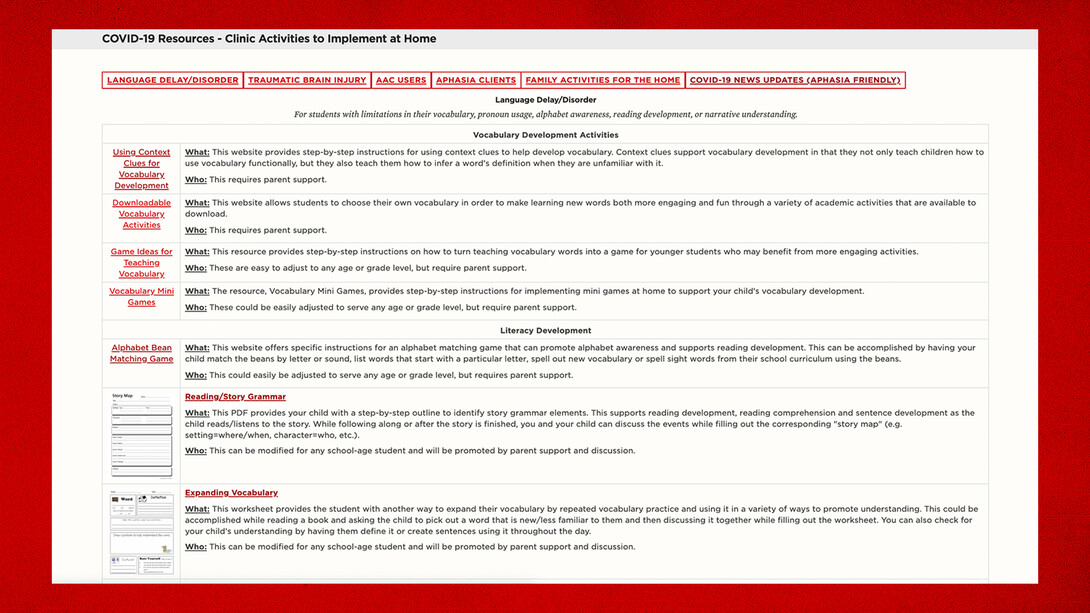
When the Barkley Speech Language and Hearing Clinic at the University of Nebraska-Lincoln closed in mid-March due to the COVID-19 pandemic, speech and language clinic coordinator Kristy Weissling saw an opportunity.
Now, the clinicians and graduate students at the Barkley Clinic have created a collection of resources on the clinic website to help individuals affected by communication disorders continue working on specific skills while the clinic is closed.
“I felt we needed something to help our clients, and communicatively vulnerable patients in general, during this crisis,” Weissling said. “I started out thinking about people with aphasia, but we expanded it to all of the populations we serve. I also thought about the fact that people on ventilators need a way to communicate, and I knew we had at least one project in the works that could help.”
That project in the works was one that began a year ago after Bryan Health approached Weissling about creating communication pages for use in the intensive care units to serve patients who were unable to communicate through speech. Weissling turned the project over to Lauryl McClintick, a graduate student in Nebraska’s speech-language pathology program, who turned it into a directed research project under Weissling’s guidance.
McClintick created several communication pages with a copyright release from Boardmaker to use the company’s images. Professionals in occupational therapy, physical therapy, speech-language pathology and nursing at Bryan Health then provided insight and feedback on the layout, symbol choice, message selection and overall usability of each page.
The end result of the project was a binder for Bryan Health with basic and complex communication pages for patients and providers to share information related to basic needs, activities of daily living, food, people, questions, pain management and leisure activities. Now the project has been adapted to a webpage where PDFs of the communication pages are available for download.
“The pages in the final project could be utilized to facilitate communication with a variety of patients whose communication is impaired, including patients who are intubated, who have been diagnosed with aphasia, and who have experienced an acquired or traumatic brain injury,” McClintick said. “Our goal has now expanded beyond this hospital to enhance the level of care provided to patients across the country during this time of need and uncertainty around the COVID-19 pandemic. It is also our hope that this project will motivate other medical facilities to do the same in creating supports to meet the communication needs specific to their patients and setting.”

Last month, as Weissling prepared for the Barkley Clinic to close, she began thinking of ways to continue to meet the needs of the clinic’s clients during the closure. Weissling asked Natalia Nolting, another graduate student in Nebraska’s speech-language pathology program, to take the lead on gathering information for another new webpage with resources for the clients.
Nolting reached out to her fellow graduate students at Nebraska, who contributed some of the resources they had created for their own clinic clients. Weissling provided helpful links to additional websites. And Nolting herself designed a handout specifically for individuals with aphasia, while also creating aphasia-friendly COVID-19 news updates so clients and families can understand everything that is happening.
The resulting webpage has resources directed toward helping individuals with language delays/disorders, traumatic brain injuries and aphasia, supports for individuals who use augmentative and alternative communication, as well as family activities to do at home that promote learning and physical activity. Nolting and Weissling plan to continue adding to the page with new resources and news updates throughout the Barkley Clinic’s closure.
“This website provides an extension of our service and aligns well with the department’s mission of enhancing the lives of individuals with special needs, their families, schools, and communities,” Nolting said. “I am excited to see how this website can make a difference in the lives of those whom we are privileged to assist. My hope is that individuals will be able to use these resources to continue to bolster their skills while at home.
“Specific updates surrounding the COVID-19 events will be especially helpful to those with language impairments. Each person deserves to feel informed, cared for, supported and loved by their community. As a future speech-language pathologist, I look forward to seeing how both clients and families, potentially around the nation, will be able to use this website as a resource to maintain a quality of life during this pandemic.”







